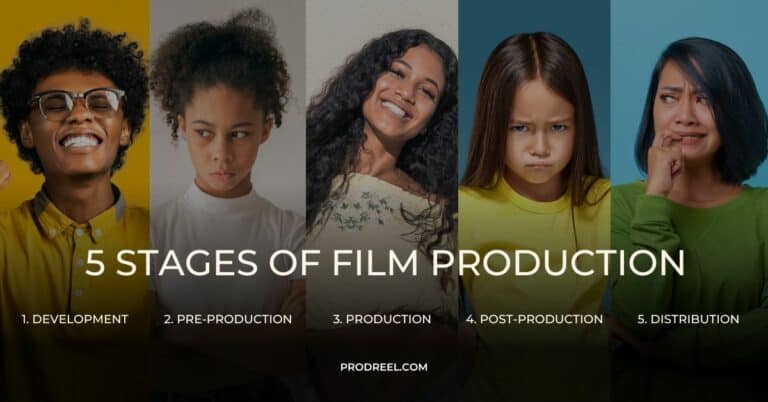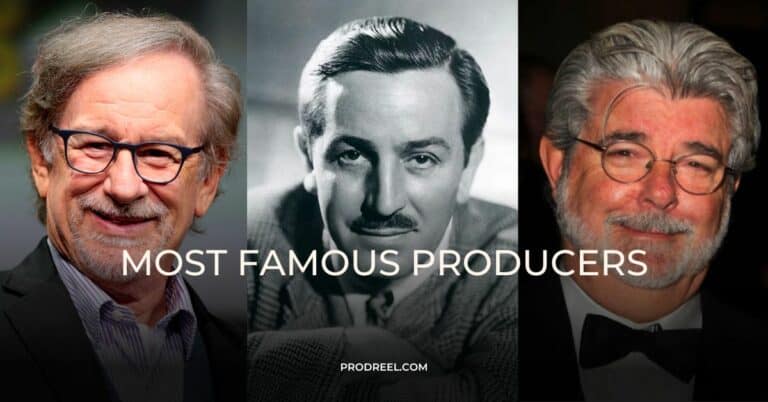What is Producing?
In the context of film and video production, producing is the overall coordination, supervision, and control of a project’s financial, technical, and creative aspects. It often involves assembling and managing the team that brings the project to life.
Who is a Producer?
A producer in general terms is someone who creates, oversees, organizes, and manages a project. The nature of the project can vary widely depending on the industry. In the context of media and entertainment, a producer typically refers to a person who oversees the production of a film, TV show, music album, or other forms of media.
In the film and television industry, a producer is responsible for coordinating various aspects of production, such as raising funding, hiring staff, managing production schedules, and making sure the project stays on budget. They’re involved in nearly every phase of the production process from the initial concept and script, through production, to post-production and distribution.
Producers often have to balance the demands of creative vision with the realities of business and finance, making it a role that requires a unique mix of creativity, practical skills, and leadership. The specific tasks a producer undertakes can vary widely depending on the size and budget of the project, as well as the type of producer role (e.g., executive producer, line producer, co-producer).
In music, a producer’s role can vary even more, but they often are involved in the recording, mixing, and mastering process. They may help shape the sound of a song or an album, working closely with musicians and engineers to achieve the desired musical outcome. Some music producers also write songs, arrange music, and even perform on the tracks they produce.
In all these contexts, being a producer essentially involves bringing together the necessary elements—people, materials, ideas, and resources—to create a final product.
What Does A Producer Do?
Project Development
The producer often starts by choosing a script or an idea, then develops it into a workable blueprint for a film or video. This involves refining the concept, securing rights if necessary, and working with a screenwriter to shape the script.
Check out some of the most famous producers and some of the films they created.
Financing
One of the producer’s most important responsibilities is securing financing for the project. This can come from a variety of sources, including production companies, private investors, or government grants and subsidies.
Pre-production
During this phase, the producer assembles the production team, including the director, cinematographer, production designer, and key cast members. They also coordinate logistics, like the shooting schedule and location scouting.
Production
When the cameras start rolling, the producer oversees the process to ensure that everything goes according to plan and stays within budget. While they typically aren’t involved in the day-to-day shooting, they’ll step in to resolve any major issues that arise.
Post-production
After shooting is completed, the producer coordinates the editing, sound mixing, music selection, and visual effects work. They also organize test screenings and work with the director to make any necessary changes based on audience feedback.
Distribution
Once the film or video is complete, the producer negotiates deals with distributors to get it into theaters, onto television, or onto online platforms. They also oversee marketing and promotion efforts to ensure the project reaches its intended audience.
Business and Legal Affairs
The producer is responsible for handling contracts, rights, permissions, royalties, and more. They ensure all legal aspects are taken care of.
It’s important to note that there are various types of producers, each with their own specific roles and responsibilities.
What Are The Different Types Of Producers?
Here are some of the most common types of producers in the entertainment industry, particularly within film and television:
Executive Producer (EP)
The EP is often the person who sources or provides the financial backing for a project. This role can involve major decision-making responsibilities and overall project oversight. In some cases, an executive producer may not be involved in the day-to-day workings of a production, but they often have the final say on many aspects.
Producer
This is the main individual in charge of the production of a film or television show. The producer is involved in all phases of production from concept to completion. They are responsible for arranging financing, hiring the director and other key personnel, overseeing the creative and financial progress of the production, coordinating with the marketing and distribution teams, and generally ensuring the project stays on schedule and within budget.
Co-Producer
A co-producer shares production duties often with the main producer or with other co-producers. This title may be given to someone who’s contributed significantly to the production, but not enough to earn the title of the main producer. The specific roles of a co-producer can vary significantly from project to project.
Associate Producer
An associate producer often handles a specific aspect of production. This could involve tasks like script editing, liaising between the producer and the director, coordinating with the post-production team, or handling other specific tasks delegated by the producer.
Line Producer
A line producer manages the daily operations of a production. They are responsible for preparing and managing the budget, hiring crew, overseeing permits and legalities, and ensuring the production stays on schedule. They usually work on set and are heavily involved in the physical aspects of production.
Supervising Producer
In television, a supervising producer often has a significant role in the writing room and assists with script revisions. They also supervise the creative process and often liaise between the writing staff and the network.
Showrunner
A showrunner is typically the head writer and overall boss of a television series. They have creative control and manage every aspect of the show’s production, from writing and casting to post-production. This term is specific to television.
The roles can vary depending on the size and complexity of the project and the structure of the production company.
Executive Producer vs. Producer
While both executive producers and producers play crucial roles in film, television, and other media productions, there are some distinct differences between their responsibilities and involvement in a project.
| Involvement | Executive Producer | Producer |
|---|---|---|
| Primary Role | High-level oversight and financing | Day-to-day project management |
| Involvement in Project | Varies widely: can be hands-on or mainly financial | Typically involved in all stages from pre-production to post-production |
| Responsibilities | Often sources or provides the project’s financing. May guide overall direction and make major decisions. | Develops initial idea, secures rights, hires key personnel, oversees production and post-production, coordinates with marketing and distribution, manages schedule and budget. |
| Level of Creative Control | Can vary. In some cases, may defer creative control to the producer. | Typically has significant creative control and decision-making authority. |
| Level of Business Involvement | Often manages or influences the financial and business aspects of a project. | Balances creative control with the business and financial aspects of the project. |
Executive Producer (EP)
- The role of an Executive Producer (EP) is often tied to the financing of the project.
- They may either provide the financing themselves or be responsible for securing funds from other sources.
- Their level of involvement in the project’s daily operations can greatly vary.
- Some executive producers are very hands-on, actively participating in the project’s development and execution.
- Others might have minimal involvement, primarily contributing by providing or securing funding.
- In television productions, the executive producer could also be the creator of the show or a principal writer, demonstrating a higher degree of creative involvement.
Producer
- A producer is usually directly involved in the daily operations of a project.
- They’re typically involved in all stages of a project, including pre-production, production, and post-production.
- The producer often develops the initial idea and secures necessary rights for the project.
- They are responsible for hiring the director and other key personnel for the production.
- Overseeing the production and post-production processes is a significant part of their job.
- The producer coordinates with the marketing and distribution teams to ensure the project reaches its intended audience.
- They ensure the project stays on schedule and within the set budget.
- The main difference between a producer and an executive producer often lies in the level of hands-on involvement and the source of the project’s funding.
- While the executive producer is usually involved in high-level oversight, particularly concerning financing and overall project guidance, a producer tends to be more involved in the daily creative, logistical, and managerial aspects of a production.
These roles can overlap, and their specific duties can significantly vary depending on the project’s size and complexity, the structure of the production company, and the specific agreement between the individuals and the production.
How to become a producer?
Becoming a producer typically involves a combination of education, experience, and networking. While there’s no single path to becoming a producer, and many successful producers have followed their own unique routes, here is a general step-by-step guide that can help you pursue a career as a producer:
1. Educational Foundation
While not strictly necessary, getting a bachelor’s degree in a relevant field such as film studies, communications, business, or arts management can provide a good foundation. You can gain a theoretical understanding of film history, storytelling, and production, as well as acquire practical skills in areas like project management, finance, and marketing.
2. Gain Practical Experience
Start working in the industry in any capacity you can. This could be as an intern, production assistant, or in any entry-level role in a production company. Practical on-set experience is invaluable, as it allows you to understand the inner workings of a production and exposes you to different aspects of the industry.
3. Work Your Way Up
Over time, strive to progress to more responsible roles, such as assistant director, production coordinator, or line producer. Each role will give you a better understanding of the production process and allow you to develop key skills.
4. Develop a Network
Build relationships with people at all levels in the industry. These connections can provide support, mentorship, collaboration opportunities, and may eventually help you secure financing or distribution for your projects.
5. Understand the Business
Learn about the financial and business side of film and TV production. This can include everything from how to prepare a budget to how to negotiate contracts and secure financing for a project.
6. Create Your Own Projects
Start producing your own small projects. This could be a short film, a web series, or any other project that allows you to take on the role of a producer. This hands-on experience is critical, and having tangible projects to showcase your abilities can open doors.
7. Stay Current
Keep up-to-date with the latest trends, technologies, and changes in the industry. Continuing to learn and adapt is key in a rapidly evolving industry like film and TV production.
8. Seek Out Opportunities
As you gain experience and build a reputation, look for opportunities to work as a producer on larger and more complex projects. This might involve partnering with other established producers, pitching projects to studios, or independently financing your own projects.
Remember, every producer’s path is unique and these steps are not strictly linear. You might find yourself moving back and forth between them as you navigate your own way. It can take years of hard work to become a successful producer, but with passion, perseverance, and a little bit of luck, it’s certainly achievable.
How to start producing?
Starting to produce involves multiple steps that range from concept development to distribution. Here is a step-by-step guide:
Step 1: Concept Development
Start with an idea. This could be a story you want to tell, a script you’ve read, or a concept you find intriguing. Take your time in this stage to really flesh out the idea and create a detailed plan.
Utilizing movie stills to present your creative idea visually is a great idea to communicate your creative style and thinking, check out our list of recommended movie stills website for your next creative project.
Step 2: Research and Planning
Understand the potential audience for your project, the market, and current trends. This will help you refine your concept and create a detailed plan, including your production timeline and budget.
Step 3: Budgeting
Determine the estimated budget for your project. This will include pre-production, production, and post-production costs, and should take into account every detail, from personnel salaries to equipment rentals, location fees, and post-production services.
Step 4: Financing
Identify potential sources of financing. This could include personal funds, private investors, grants, sponsorships, or even crowdfunding. Prepare a strong pitch to convince potential investors of the value of your project.
Step 5: Pre-Production
Hire your key creative team. This usually includes a director (if that’s not you), cinematographer, production designer, and other important roles. Cast your actors, scout and secure locations, and finalize your script and shooting schedule.
Step 6: Production
This is when you shoot your project. As a producer, your job during this phase is to ensure everything runs smoothly. You’ll oversee the day-to-day operations, troubleshoot any issues that arise, and make sure the project stays on schedule and within budget.
Step 7: Post-Production
After shooting is complete, you’ll coordinate the editing, special effects, sound design, scoring, and other post-production activities. You’ll also start ramping up marketing efforts during this phase.
Step 8: Distribution
Secure distribution for your completed project. This could involve submitting to film festivals, pitching to streaming platforms or networks, or even distributing it yourself online.
Step 9: Marketing and Promotion
Develop and execute a marketing plan to ensure your project reaches its intended audience. This might involve creating promotional materials, leveraging social media, coordinating press coverage, and organizing screenings or premieres.
Step 10: Evaluation
After the project is complete, take time to evaluate the process. Consider what went well, what could be improved, and what lessons can be learned for future projects. This is also a good time to collect feedback from your team and audience.
Remember, each project is unique, and these steps may vary or overlap depending on your specific circumstances. Each step is a learning experience, so don’t be discouraged if things don’t go perfectly. With each project, you’ll gain more experience and knowledge, making you a more effective and successful producer.
Conclusion
In conclusion, producing is a multifaceted role that stands at the crossroads of creativity and business in the world of film and video production. A producer oversees every aspect of a project, from the earliest stages of development through distribution, serving as the driving force that brings a creative vision to life while managing budgets, schedules, and personnel.
Producers wear many hats, operating as leaders, managers, problem solvers, and sometimes even as mentors. The role can vary widely depending on the specifics of the project and the type of producer involved, but at its core, producing is about facilitating the collaborative process of storytelling.
Whether they’re securing financing as an executive producer, handling the daily logistics of a shoot as a line producer, or providing support in a variety of tasks as an associate producer, every type of producer plays a critical part in the complex machinery of film and video production.
While the path to becoming a producer may be challenging, requiring a unique blend of creative instincts, business acumen, and exceptional interpersonal skills, it’s a rewarding career that sits at the heart of the filmmaking process. With passion, perseverance, and a commitment to storytelling, anyone can embark on the journey of producing and play a part in bringing compelling stories to the screen.







